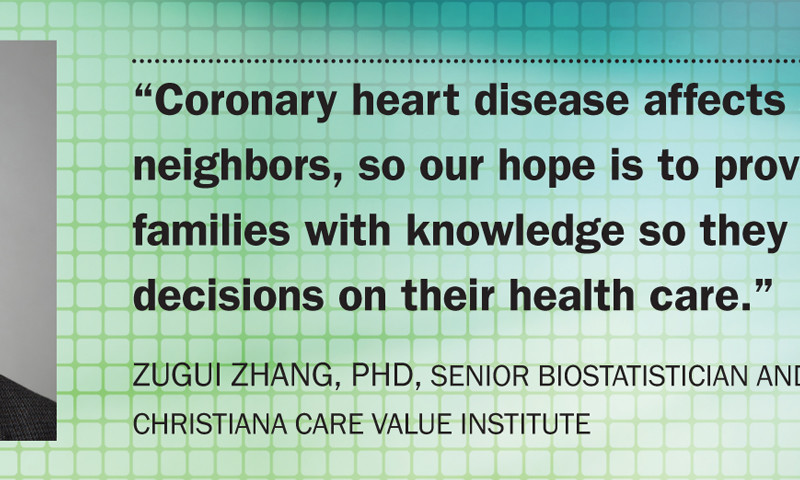Study shows grafting surgery performs better than angioplasty

An article by Christiana Care researchers in the January 2015 Journal of the American College of Cardiology reports that coronary artery bypass graft surgery (CABG) commonly used to treat patients with coronary heart disease results in improved quality of life, but also costs more than another often-used, less invasive technique: percutaneous coronary intervention (PCI).
The research represents the first of its kind nationwide to evaluate and compare hundreds of thousands of clinical and claims data to determine both the survival benefit and overall costs of CABG compared to PCI.
The American College of Cardiology Foundation/The Society of Thoracic Surgeons Collaboration on the Comparative Effectiveness of Revascularization Strategies (ASCERT) study found that patients who underwent bypass graft surgery lived longer, were able to function better and had fewer additional procedures than those treated with angioplasty.
Researchers drew their conclusions by analyzing a widely-accepted metric known as quality-adjusted life-years.
“While other studies have compared the costs of the two types of treatment, we wanted to probe deeper to understand the value of these procedures to patients,” said Zugui Zhang, Ph.D, a senior biostatistician and scholar at Christiana Care’s Value Institute, and lead author in the study.
Over a four-year period, the study looked at people age 65 or older who had coronary heart disease in two or three of their heart vessels. In addition to the quality-of-life metrics, researchers found the grafting procedure resulted in higher costs per patient than angioplasty in three areas:
- Hospitalization was on average $10,670 more.
- Clinical care after surgery averaged $8,145 more.
- Lifetime projected costs after the surgery averaged $11,575 more.
Sponsored by a grant from the U.S. National Heart, Lung and Blood Institute and an Institutional Development Award from the National Institute of General Medical Sciences of the U.S. National Institutes of Health, ASCERT studies evaluate the long-term effectiveness and costs of CABG and PCI.
Coronary heart disease is the most common type of heart disease, killing nearly 380,000 people annually, according to the U.S. Centers for Disease Control & Prevention.
“Coronary heart disease affects so many of our neighbors, so our hope is to provide patients and their families with knowledge so they can make informed decisions on their health care,” Zhang said. “Through this study, we have found that coronary artery bypass grafts provide a reasonably better value to patients when compared to angioplasties.”
Christiana Care co-authors on the study are William S. Weintraub, M.D., MACC, FAHA, FESC, John H. Ammon Chair of Cardiology at Christiana Care, and Paul Kolm, Ph.D., director of biostatistics. Dr. Weintraub is also the founding director of the Center for Outcomes Research at the Christiana Care Value Institute, which leads the way in conducting real-world research on today’s most pressing health care issues.
The Value Institute’s mission is to develop, deliver and evaluate innovative health care solutions that meet the Triple Aim of improving patient experience and population health while reducing health care costs.